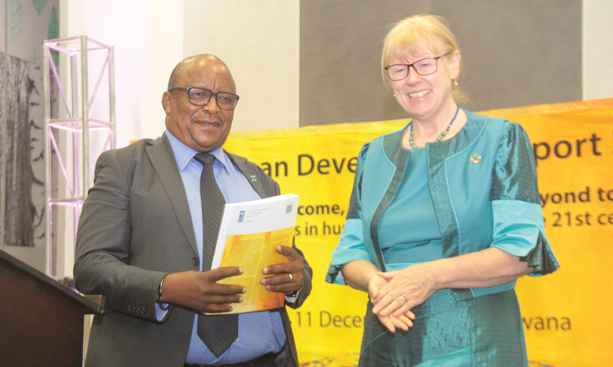The various inequalities that people across the globe experience have been seen to be a road block to achieving the 2030 Agenda for Sustainable Development.
This was announced at the launch of the United Nations Development Programme (UNDP) Human Development Report of 2019 titled “Beyond income, beyond averages, beyond today: Inequalities un human development in the 21st century”.
Discussing the report, UNDP resident Representative to Botswana, Jacinta Barrins explained that inequalities are determined at birth, the financial status of the family one is born into, the society into which the individual is born into as well as the opportunities presented to them in life. Giving an example of the access to health care by two pregnant women from two different places, a sub-urban area in Gaborone and Gantsi, a semi-rural village in the Kgalagadi District, she noted that the pre-natal care that both women receive is incomparable as the one in the suburb has comprehensive access to medical assistance compared to the expectant mother in Gantsi. “An inequality has already been set before these children are born,” she observed.
Barrins also explained that the inequalities spread out to other facets of the children’s lives in areas such as early childhood development. Barrins said a child who has had a comprehensive early childhood learning stands a far much better chance of excelling in their studies and being prosperous in life over one that has not had the privilege. Still using the two areas as an example, the UNDP Resident Representative explained that a child in the sub-urban area stands a much better chance of getting quality early childhood learning over the one in the rural area. Other basic human necessities such as access to clean water, electricity and nutrition will not be at par for both children, she revealed.
“The report states that the margin of basic capabilities is going down while that of advanced capabilities growing and is needed for the person of tomorrow,” she said, adding that people born today, will need a different set of capabilities as compared to those born years ago.
For his part, the Minister of Local Government and Rural Development, Eric Molale noted that the eradication of poverty is an impossible feat despite government’s efforts to take the challenge head on. He noted that government’s pronouncement to eradicate poverty is proof of its efforts to reduce the number of people living in abject poverty. “According to the 2019 UNDP report, since 1990 when the global report was first published, the index has grown by 22.4 percent. This is equivalent to an average annual growth of 0.72 percent,” he stated. The report reveals that the number of countries classified as having a very high human development rose from 12 to 62 between 1990 and 2018.
Molale also noted that countries classified as having low human development decreased from 62 to 36 and countries such as The Seychelles and Turkey lead the ranks in high human development over The Philippines, South Africa, Indonesia and Bolivia that have recently been classified as high human development areas. “Despite the progress made, there still remains a challenge in the unequal distribution of development as 20 percent of human development was lost in 2018 globally,” he revealed.
